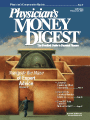Publication
Article
Physician's Money Digest
Rule Changes May Make Your Life Easier
There's good news for physician-investors who are worriedabout stretching outtheir retirement nest eggs. And, surprisingly,it's coming from an unlikelysource: the IRS. Indeed, the peopleyou thought were the bearers of onlybad news have just made life easierfor you. So, before you go looking inthe air for flying pigs or layering yourclothing in preparation for freezingtemperatures, check out some of thebreaks you may be receiving.
PRESENT FOR THE PEOPLE
The IRS has finalized and clarified (and in some instances improved)the surprise regulations itproposed in early 2001, which dramaticallysimplified the rules requiringminimum withdrawals from tax-deferredretirement plans such as401(k)s and IRAs. Knownas required minimum distribution(RMD) rules, theserules require owners ofIRAs and retirement planaccounts to begin makinglifetime minimum annualwithdrawals from their accountsno later than April 1following the year they turnage 70 1/2. (The exception isfor a plan sponsored by acurrent employer.)
These RMD rules alsoaffect the distribution calculation,which has recently undergone thebiggest change. When the IRS unexpectedlymade its sweeping changesin 2001, it replaced the complicatednumber of options individuals had tochoose from regarding the calculationof their withdrawals with a simpletable known as the uniform table.Using this table, retirees were able tofind their RMD easier (technically,the RMD is calculated separately forqualified plans and for the totalamount of your IRAs).
Under a mandate from Congress,the IRS has updated the 2001divisors to take into account increasedaverage life expectancy,adding on approximately 1 year. Thegoal is to make the divisors largerand the minimum withdrawalssmaller, thus further stretching outretirement assets.
Although any account owner canuse the uniform table, an accountowner whose sole beneficiary spouseis younger by more than 10 years canuse a joint and last-survivor table,which shrinks the minimum withdrawalseven more. Under the finalrules, the IRS has made this jointtable more generous.
Of course, you can withdraw morethan the minimum RMD if you wantto or need to. If you don't withdrawmore than the minimum, however,your money can keep growing. Inaddition, if you fail to take out at leastthe minimum from your retirementaccount, you will be penalized 50% ofthe shortfall. So always remember tomake your annual RMD.
RECENT CHANGES IN NAME
Another significant change in theretirement regulations concerns thenaming of beneficiaries. Under thesimplified rules introduced by theIRS in 2001, account owners couldchange the distribution calculationby changing the beneficiaries (up tothe time of the owner's death).Furthermore, though beneficiariescouldn't be addedafter the owner's death,the new rules would allowalready named beneficiariesto disclaim their inheritanceas late as December31 of the year followingthe owner's death. Thebeneficiaries' RMD wasthen recalculated based onthe life expectancies of theremaining heirs.
Under the now-finalrules, the December 31 date has beenpushed up to September 30 of theyear after the owner dies. This makesit easier to calculate the initial minimumdistribution. The IRS has alsoclarified another beneficiary issue:What happens if the beneficiary ofthe IRA account owner dies beforethe September 30 date without naminga successor beneficiary? Underthe proposed rules, the beneficiary'sestate and the heir of that estatewould have to inherit and empty theaccount quickly. Now the successorheir is permitted to make withdrawalsbased on what would have been theoriginal beneficiary's life expectancy.
IRA beneficiaries who inheritedunder the old rules can switch to thenew distribution rules—possiblyallowing them to extend the life oftheir IRA accounts and save taxes. Toget up to date on these new rules orfor more details about how they'llaffect you, consult with a qualifiedretirement plan expert.
This column is produced by the Financial
Planning Association (www.fpanet.org), the
membership organization for the financial
planning community.
